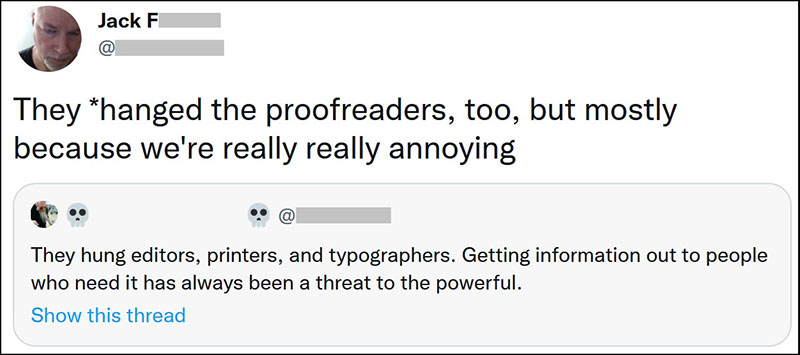
I worry that I have, in these blogs, painted a deceptively glamorous picture of the professional language persons ’s lifestyle. Sure, there are moments of adventure—wrangling adverbs, slashing about with your red pencil, finding the perfect pithy phrase—but the struggle for clarity of expression is often a lonely one. The larger world tends to regard professional language persons not as bulwarks against incoherence, but as poopers ever in search of a party.
The curse of professional language persons, you see, is that they are always language persons, 24/7, even when not on the job. It’s just how our brains are wired. Some of us have always been this way; for others, our years in the business have reshaped our thought patterns. But whether one is a language person by birth or acclimation, that perceptual frame, once acquired, is nigh-impossible to abandon.
Get a free sample proofread and edit for your English document.
Two professional proofreaders will proofread and edit your English document.
Or, to put it plainly, we can’t turn it off, even in the informal context of social media. I recently saw a Twitter thread about authoritarians suppressing independent journalism by targeting the people who practice it. But even given this serious topic, my proofreader brain kicked in:

Now, I could have let that pass without comment. Much like “pay” (discussed in my last blog), “hang” is a word with multiple similar meanings but which also has one highly specific meaning—in this case, to kill a person by suspending the body with a rope around the neck, often as a means of capital punishment—that has historically taken a unique past participle. But within my lifetime, that centuries-old distinction—a picture is hung, a criminal is hanged—has been eroding, with “hung” used for all senses. It’s no coincidence, I think, that this shift has occurred as execution by hanging has itself become less common, having been abolished throughout the English-speaking world by the mid-1960s.
I made my joke for a couple of reasons. First, the historic significance of execution by hanging, and the way it has shaped our language as the source for English idioms ranging from “to stick one’s neck out” to “gallows humor,” argues for the continued usefulness of the hanged/hung distinction. (And though I won’t be so indelicate as to delve into the slang meaning of “hung” as an adjective, viewers of 1974’s Blazing Saddles will be familiar with the potential for comical misunderstanding in describing a male-identified person as such when you mean “dead by hanging.”)
Secondly, I lean a little conservative linguistically. While I’m not a full-on prescriptivist, I believe that, as a rule, established modes of usage are more conducive to clear expression than innovative ones, particularly (e.g., hanged/hung) when the innovation folds multiple meanings into a single word.
Being a professional language person means feeling a certain awkward dread when looking at social media when some news outlet describes the killing of civilian bystanders by police or soldiers in vague or exculpatory terms that well-meaning critics will describe as “passive voice,” even if they are nothing of the sort.
Another example: Over the past seven days and in two separate places, I have seen a nonstandard use of “exuberant,” a word you may remember from your college boards. Etymologically it means “overflowing or fruitful” and in common usage refers to being joyful or filled with unbounded glee:
Ex: The pop song had an exuberant chorus.
Ex: The teammates were exuberant after their victory.
The two examples I saw this week (both in publicity blurbs about upcoming movies, oddly) had overtones of monetary excess: one referred to a fashionable man’s “exuberantly priced wardrobe,” whereas the other mentioned financial high rollers attending “exuberant parties.”
A more appropriate word for both of these instances would be the similar-sounding “exorbitant,” which comes from root words meaning “knocked off the path” (or “out of orbit”), but which commonly has connotations of excessively high-priced, lavish, or over-extravagant.
If I’d seen it only once, I might have dismissed it as a typo or malapropism. But having seen it twice, I have to wonder if we are witnessing a linguistic shift in real time.
No Professional Language Person can help but notice these changes. How we respond is determined by whether the individual leans toward prescriptivism or descriptivism. The latter will note a collapse in the distinction between two etymologically unrelated words with observational interest, whereas the former may wish to scream into a pillow, and not with unbounded glee.
Jack F.
Get a free sample proofread and edit for your English document.
Two professional proofreaders will proofread and edit your English document.
Get a free sample proofread and edit for your document.
Two professional proofreaders will proofread and edit your document.
We will get your free sample back in three to six hours!